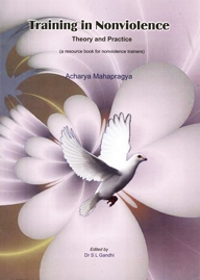The world we live in today is marked by untold suffering on account of the environment of a culture of violence and hatred spreading fast across the world. We see the devastating impact of violence on individuals, families, social, religious and ethnic groups. The world today is in the grip of perpetual fear and a sense of insecurity prevails. Though there isn’t an immediate threat of another nuclear holocaust, the way terrorist culture is spreading, it isn’t ruled out altogether. Alarmed by this situation United Nations declared a decade of a culture of peace and nonviolence for the children of the world (2000-2010) and called upon the people of the world to make intensive efforts to stem this tide and wean the children and youths off the culture of hatred and violence. The decade will come to an end after less than two years from now. Though an environment in favour of ahimsa has been created, violence continues to multiply. It is not expected to create a lasting effect unless children are exposed to practical steps for the internalization of a culture of ahimsa. We believe that mere discourses and lectures cannot bring about a change in the attitudes of children and youths. An attitudinal change can occur only when the young and old also undergo rigorous practice. The seeds of both violence and hatred lie dormant in human mind. The left hemisphere of human mind, which is a storehouse of anger, hatred and violence, is more active today because there are thousands of organized centers for training in violence across the world. The right hemisphere of human brain, which is a storehouse of eternal values like nonviolence, tolerance, patience, forgiveness etc. remains inactive. To activate it training in nonviolence is imperative. We have developed a practical course of training in nonviolence on the basis of a series of experiments we made during the last three decades. We have had highly successful results. We observed that the students who took this course had the desired changes in their attitudes. The main objective of this course is to develop a balanced human being who combines both a scientific outlook on life and a deep spiritual insight. It endeavours to enhance his emotional competence.
Main Components of the CourseThe course is divided into four parts. They are as follows:1. Theory and History of NonviolenceThe detailed syllabus of each part of the course is given below:
2. Transformation of the Heart
3. Nonviolent Lifestyle
4. Right Means of Livelihood and Training in the Tools of Self-employment
 Acharya Mahaprajna
Acharya Mahaprajna

